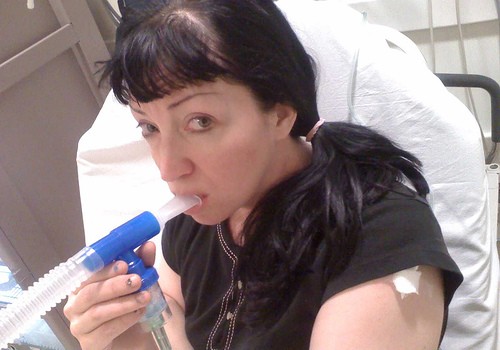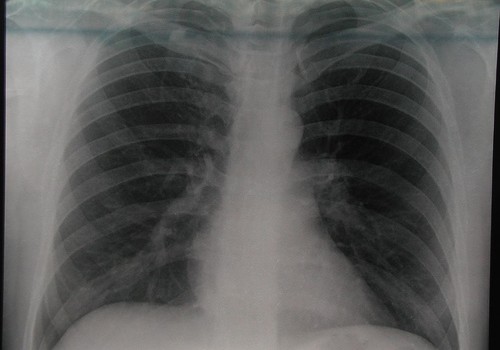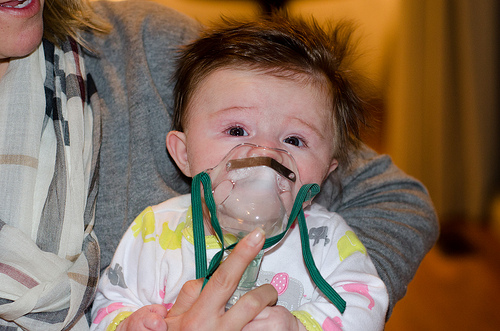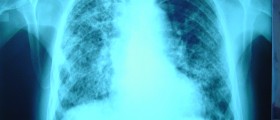
Bronchitis In General
Bronchitis is a condition that results from the overactivity and excessive growth of mucus-producing glands in the lining of the larger airways in the lungs. Acute bronchitis, a condition that typically lasts 10 days or less, is a common complication of chest colds. Chronic bronchitis, a condition that last for months or years, can result from a series of lung infections, smoking, prolonged exposure to air pollution, or genetics. As the disease progresses, the lungs are remodeled so that the amount of air that can pass through them becomes less and less, often in the context of the tissue changes caused by emphysema. Although bronchitis can become a chronic condition, sometimes a triggering event can make the symptoms of bronchitis worse than usual.
- Important notification about information and brand names used in this slideshow!
- Photo courtesy of Violet Blue by Flickr : www.flickr.com/photos/violetblue/2161092721/
- www.webmd.com/lung/understanding-bronchitis-basics
- http://www.webmd.com/lung/ss/slideshow-bronchitis-overview

Symptoms Of Bronchitis
The most prominent symptom of bronchitis, both acute and chronic, is cough. In acute (short-term) bronchitis, cough usually improves over the course of a few days, but in chronic bronchitis, cough can get worse and worse. There may or may not be copious expectoration of phlegm; only about 50% of people who get bronchitis cough up green, yellow, clear, or blood-tinged sputum. Fever is not common with bronchitis; it suggests either influenza or pneumonia. Along with coughing, bronchitis can cause chest pain and general fatigue. There may also be sore throat, runny nose, stuffy nose, headache, earache, and muscle pain. In children, bronchitis can result in cyanosis, the skin turning blue, but this is rare in adults unless there is underlying chronic obstructive pulmonary disease (COPD).
- Important notification about information and brand names used in this slideshow!
- Photo courtesy of claudius9uk by Flickr : www.flickr.com/photos/claudius9uk/3462890921/
- Knutson D, Braun C. Diagnosis and management of acute bronchitis. Am Fam Physician. May 15 2002. 65(10):2039-44.

Chronic Bronchitis
Bronchitis is said to be chronic when there is excessive production of mucus in the lungs that causes coughing for at least 3 months out of the year in at least 2 successive years. All the coughing can change the very structure of the lungs. Phlegm is basically a collection of white blood cells, and white blood cells produce hormones that cause inflammation. As the lining of the airways in the lungs becomes inflamed, it shrinks. The longer bronchitis lasts, the smaller the air passages become, the harder it is to breathe, and the symptoms of bronchitis flare-ups become more and more severe.
- Important notification about information and brand names used in this slideshow!
- Photo courtesy of US Air Force by Flickr : www.flickr.com/photos/usairforce/5448538317/
- Macfarlane J, Holmes W, Gard P, et al. Prospective study of the incidence, aetiology and outcome of adult lower respiratory tract illness in the community. Thorax. Feb 2001.56(2):109-14.

Acute Bronchitis
Acute bronchitis begins with an infection, allergy, or toxic exposure that causes the lining of the large air passages in the lungs known as the bronchi to become inflamed. After inflammation, these linings shed dead tissue and white blood cells that become phlegm. The phlegm interferes with breathing and causes cough and fatigue. A typical bout with acute bronchitis generally lasts about 10 days. When the inflammation extends down the tips of these bronchi into the air sacs in which the bloodstream absorbs oxygen, a condition called bronchopneumonia results. If episodes of acute bronchitis happen often enough, bronchitis is said to be chronic, if there are three months or more of bronchitis symptoms in each of two consecutive years.
- Important notification about information and brand names used in this slideshow!
- Photo courtesy of Stewart Butterfield by Flickr : www.flickr.com/photos/stewart/71003226/
- Knutson D, Braun C. Diagnosis and management of acute bronchitis. Am Fam Physician. May 15 2002.65(10):2039-44.

What To Expect When You See Your Doctor
Several other respiratory conditions can imitate bronchitis, so your doctor will rule them out before giving you treatments that are appropriate for bronchitis. The doctor will make sure that the problem is not really exercise-induced asthma, a bacterial infection of the trachea, cystic fibrosis, influenza, hyperreactive airway disease, or a reaction to a foreign body you have swallowed that was aspirated into your lungs. Your doctor will also ask questions about possible exposure to airborne agents at home or work. The doctor will also want to rule out pneumonia. Elderly people often show no obvious signs of pneumonia until it is too late, so the doctor may order a chest x-ray.
- Important notification about information and brand names used in this slideshow!
- Photo courtesy of marsmett tallahassee by Flickr : www.flickr.com/photos/63596312@N03/5821107867/
- Wenzel RP, Fowler AA 3rd. Clinical practice. Acute bronchitis. N Engl J Med. Nov 16 2006. 355(20):2125-30.

Causes Of Bronchitis
Acute bronchitis is most often caused by infection with bacteria or viruses. The most common bacterium that causes bronchitis is strep, the same strain that causes strep throat. Several different kinds of viruses can generate the inflammation that results in mucus production and clogged air passages. These include influenza viruses, rhinoviruses (colds viruses), respiratory syncytial viruses, and adenovirus (another kind of "colds" virus). Bronchitis can be caused by smoking, and by exposure to toxic fumes at work or at home. Cigarette smoking is the cause of most cases of chronic bronchitis, although infections with bacteria and/or viruses cause exacerbations of symptoms.
- Important notification about information and brand names used in this slideshow!
- Photo courtesy of DucDigital by Flickr : www.flickr.com/photos/ducdigital/3206288700/
- Macfarlane J, Holmes W, Gard P, et al. Prospective study of the incidence, aetiology and outcome of adult lower respiratory tract illness in the community. Thorax. Feb 2001. 56(2):109-14.

Diagnosing Bronchitis
Since more than one disease can cause symptoms similar to bronchitis, the doctor will perform a differential diagnosis to make sure that the problem is bronchitis. When the cough is persistent, the doctor may order a lab test called sputum cytology to see if the viscosity or "stickiness" of the phlegm is a correctable problem. The doctor usually will order a chest x-ray to see if the condition is progressing or has progressed to pneumonia, especially in patients who are over the age of 60. The doctor may also perform a visual inspection of the bronchi through a procedure known as bronchoscopy to make sure there are no foreign objects in the lungs. If there are indications of bacterial infection, the doctor may run a culture to know which antibiotic will work best, and the doctor may run a blood test for a hormone called procalcitonin to measure the amount of inflammation in the lungs.
- Important notification about information and brand names used in this slideshow!
- Photo courtesy of Flick_R. by Flickr : www.flickr.com/photos/rodrigo_campos/481665175/
- Briel M, Schuetz P, Mueller B, et al. Procalcitonin-guided antibiotic use vs a standard approach for acute respiratory tract infections in primary care. Arch Intern Med. Oct 13 2008.168(18):2000-7
- discussion 2007-8.

Bronchitis And Asthma/COPD
Bronchitis, asthma, and chronic obstructive pulmonary disease, also known as COPD, often occur together, especially in smokers. Repeated bouts of inflammation in the lungs can cause them to develop fibrous tissue that narrows airways. These remodeled, smaller airways become evern more susceptible to infection and irritation, and become smaller and smaller. That is how bronchitis can progress to COPD. The high levels of inflammation in the lungs with acute bronchitis can cause reactive airway disease or asthma. To keep occasional episodes of acute bronchitis from morphing into something worse it is essential to avoid irritants, especially cigarette smoke, and to avoid colds and flu.
- Important notification about information and brand names used in this slideshow!
- Photo courtesy of snrober1 by Photobucket : media.photobucket.com/user/snrober1/media/IMG00182.jpg.html?filters[term]=bronchitis&filters[primary]=images&filters[secondary]=videos&sort=1&o=4
- Centers for Disease Control and Prevention. Interim results: state-specific seasonal influenza vaccination coverage - United States, August 2009-January 2010. MMWR Morb Mortal Wkly Rep. Apr 30 2010. 59(16):477-84.

How Is Acute Bronchitis Treated?
The treatment of acute bronchitis is supportive. That is, it is really the body itself that resolves the disease, not anything the doctor does or the pharmacist provides. Most cases of acute bronchitis take 10 to 20 days to resolve. During that time, severe fatigue may require lots of bed rest, with enough pillows to prop up high enough to make breathing easier. Anything that makes phlegm easier to cough up speeds healing of the disease. This can involve the use of a vaporizer to moisten the air, frequent drinking of warm (not boiling hot) beverages, and that favorite remedy of grandmothers over much of the world, chicken soup.
- Important notification about information and brand names used in this slideshow!
- Photo courtesy of Spencer Blake by Flickr : www.flickr.com/photos/spedog/8380816777/
- Knutson D, Braun C. Diagnosis and management of acute bronchitis. Am Fam Physician. May 15 2002. 65(10):2039-44.

How Is Chronic Bronchitis Treated?
Treatment of chronic bronchitis is focused on relieving symptoms. Treatments that help you feel better actually change the course of the disease. Because the airways are changed by inflammation, reducing inflammation prevents narrowing of breathing passages. The doctor may prescribe cough suppressants that act on the central nervous system, usually containing codeine, and the doctor may run cultures of sputum to determine the right antibiotic for treating bacterial infections of the lungs. There is general agreement in the medical community that flu shots are essential for people who have chronic bronchitis. Not only does bronchitis make flu symptoms worse, flu makes brochitis symptoms worse. Also essential is avoiding cigarette smoke.
- Important notification about information and brand names used in this slideshow!
- Photo courtesy of Buster Benson by Flickr : www.flickr.com/photos/erikbenson/6503647137/
- Nichol KL, Wuorenma J, von Sternberg T. Benefits of influenza vaccination for low-, intermediate-, and high-risk senior citizens. Arch Intern Med. Sep 14 1998.158(16):1769-76.



























Your thoughts on this
Loading...